In Ukraine, anxiety is growing due to the fact that young people, especially 17-year-old boys, are moving abroad en masse, looking for new opportunities and prospects. This phenomenon is not only caused by socio-economic factors, but also related to the anxieties and hopes of parents who are trying to ensure a better future for their children.
"In the summer, I got a job working in a restaurant, and an older colleague asked me why I wasn't abroad yet, because I'm only 17," says Oleksandr Mysan from Kyiv, who moved to Slovakia two weeks before he came of age. The boy entered the university, studies the language and plans to "see the world".
His father, Oleksandr Mysan Sr., is a serviceman of the Ukrainian Armed Forces. The father of four had the right to avoid military service, but chose to join the defense of his country.
"I would very much like my son to stay in Ukraine and enter a military university or SBU academy, but he sees his future differently," says the father. And he adds: "so that my sons would not fight, I myself joined the Armed Forces."
Oleksandr Mysan Jr. made the decision to leave very quickly: he was in a hurry to make it before he came of age.
In Ukraine, more and more people are talking about the problem of the departure of young men who have not yet reached the age of majority. Although mobilization in Ukraine starts at the age of 25, it is not possible to leave after the age of 18, which is why sometimes parents send their children abroad even before they reach adulthood.
But it is indicative that this is a movement in two directions, and there are boys who, on the contrary, return to Ukraine as soon as they turn 18.
The war intensified the demographic crisis in Ukraine and became the key reason for the population decline, Daryna Marchak, the first deputy minister of social policy of Ukraine, admits to the BBC.
According to her department, 3.5 million people left Ukraine for the USA and the EU because of the war. But in the EU they say that they have officially accepted more than 4.2 million.
Forced migration, a decrease in the birth rate, an increase in premature mortality - these are the challenges Ukraine has faced.
What long-term consequences will this have and whether there will be a lost generation in Ukraine - BBC Ukraine found out.
The perspective of mobilization
The idea of emigration arose in Oleksandr Mysan Jr. under the influence of conversations with his peers. They discussed the fear of potential mobilization and the uncertainty of the future in Ukraine during the war.
The boy was accompanied to Slovakia by his uncle. At the border, passports and military registration documents or prescriptions were checked. Each young man receives these documents after he registers at the age of 16. The border guards did not demand any additional permits from the TCC, says Oleksandr.
In Slovakia, an adult cousin was waiting for the boy. Despite this, Oleksandr is terribly short of friends, relatives and a girlfriend there.
"In Kyiv, I went somewhere all the time, talked. And here sometimes I visit refugees who are waiting in line for documents - just to chat," the boy shares.
But he was afraid to stay in Ukraine. He says that he has no guarantees that in a year or two he will not be called to the army (suddenly the rules will change), as well as a feeling that the war will end soon.
"Making the choice to leave often means losing friends, leaving family, adapting to a new culture, feeling guilty, and it's very difficult. Those who choose to stay face the anxiety of being drafted," child psychologist Svitlana Pisareva from the "Voices of Children" foundation describes the problem.
"I would not like to go to war. It's scary. It makes no sense to find a rear position to sit out, because then it's better to sit out at home," Mysan Jr. admits.
And he says that many of his friends hold the same opinion. They do not have anti-Ukrainian sentiments and condemn Russian aggression, but the prospect of fighting scares them, the boy said.
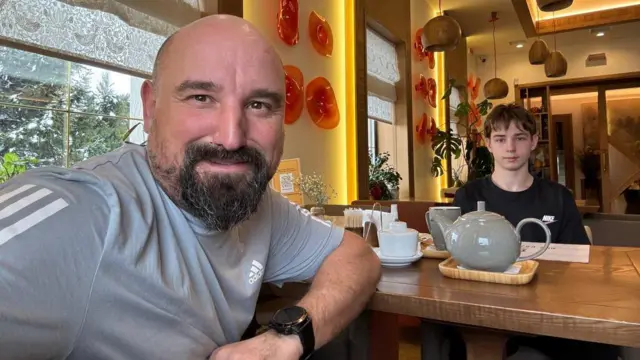
Author of the photo, Oleksandr Mysan
"I only have one friend who joined the third assault unit when he turned 18. The rest of his friends are not planning to fight yet," explains Mysan.
You can join the army after reaching the age of 18 only voluntarily.
Despite the feeling of loneliness abroad, the boy does not plan to return to Ukraine until the end of the war.
"Of course, young men, as a rule, are hot-headed, but war is scary, and everyone is afraid, whether they admit it or not. This fear lives in the mind, because it is about life and death," Svitlana Pisareva explains this choice.
This fear is strengthened by Russian propaganda and the underperformance of schools and parents, Oksen Lisovyi, Minister of Education and Science, suggested in an interview with BBC Ukraine. In his opinion, teenagers should be "assured of the value of having their own country."
It is for this reason that the "Protection of Ukraine" program was updated in Ukraine. Children will learn the basics of national security, drone control, first aid and more. According to Lisovoy, this subject will help explain "why having your own country and defending it is about personal success."
"Young people (and their parents) do not see a future here, so they will look for a better life outside of Ukraine, with the hope that maybe the children will return after studying. And maybe not. They definitely don't want to go to war at the age of 17," explains Oleksandr Mysan Sr., who himself is currently defending the country, about his son's choice.
Seventeen-year-old girls and boys, even in peacetime, experience a period of titanic changes in their lives, explains Svitlana Pisareva. Graduation, exams, choosing an educational institution is a time of tension and a high level of anxiety.
This period is about fear and the desire to grow up, difficult responsible choices, searching for answers to the question: "who am I and what do I want?" who are my people?", pressure from parents and society, which creates numerous internal conflicts, explains the psychologist. The war only strengthens them.
Pisareva says that the decisions made now have a profound effect on the future life of teenagers. But one's own life experience, which can be relied on in making these decisions, is not yet available.
The problem is limited to the age of 25
Parents often make the decision to leave for teenagers.
Iryna from Kyiv spent the summer preparing for the departure of her seventeen-year-old son to study in Slovakia.
Ian has Tourette's syndrome - a congenital neuropsychiatric disease, due to which the boy needs a special daily regimen and diet. In the absence of these conditions, the disease can get out of control.
The military medical commission recognized him as "fit for service in certain units and units."
This means that, if necessary, he can serve in the headquarters or in the rear (according to the new law on mobilization, this is an alternative to what was previously defined as "limited fitness").
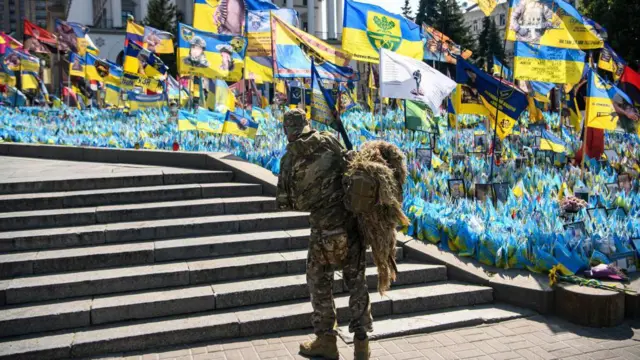
Photo by Maksym Marusenko/Getty Images
The Law on Mobilization stipulates that people are drafted into the army after reaching the age of 25.
But the feeling that they will not be able to leave the country after coming of age pushes them or their parents to use the last chance to go abroad. In addition, there is a conflict that sick boys who are unfit for service in peacetime can be mobilized in wartime up to the age of 25.
Periodic statements by the authorities about the need to further lower the mobilization age do not add to the certainty of the family.
"I put so much effort into raising him. There is a big problem with the treatment of Tourette's syndrome in Ukraine," the mother explains.
Iryna, a medical psychologist by education, was looking for alternative approaches, independently studied the protocol of American and European doctors.
The woman works as a masseuse and believes that her son also has "beautiful hands". In Slovakia, he will study to become a rehabilitator - in order, in particular, to help Ukrainian veterans in the future.
"We wanted to enter the physical education institute. It is close to our house and there is a good education. But after the decision of the VLK, they changed their mind. My son will always be able to return to Ukraine. But now, as a mother, I have to create conditions for studying without military threats," Iryna explains her intentions.
Return to Ukraine to the girl
"People are not confident in Ukraine, they do not see a future here. It's because of a misunderstanding that they are Ukraine," says eighteen-year-old Maksym Semidotskyi about his views on life.
In the spring of 2024, he returned to Ukraine from Ireland, where he left with his family in 2022 from the occupied Kherson region.
Maxim's mother died before the war, his guardian was his older sister. After waiting for adulthood and the opportunity to manage his own destiny, the boy decided to go to Ukraine.
"My relatives warned me that it would be difficult, but I bought a plane ticket myself. If I figured out how to do it, I'm able to figure out the other thing as well," Maksym says about his decision.
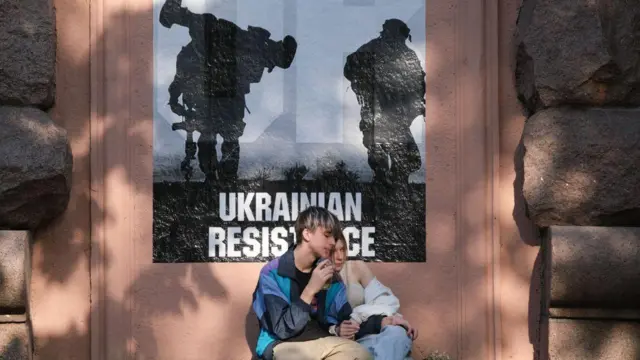
Author of the photo, UNIAN
In Ukraine, a girl was waiting for Maxim - also an orphan from Novaya Kakhovka. After almost two years of separation, they finally met in Kyiv this spring.
Lyera entered a medical college, and Maksym resumed training as an electric welder.
"What I want most now is to win, to return to my free city and rebuild it," the boy says.
He is not afraid of conscription and mobilization: "I would go to fight right now, but I need a profession in order to earn a living after the war."
To Poland for education
The government assures that they understand the challenges faced by Ukrainian youth during the war and are trying to help in any way they can.
The head of the Ministry of Youth and Sports, Matviy Bidny, lists: in 2023, the Ukrainian Youth Fund was created, the grant competition "Career Start. Youth Guarantee Program", which should help with the first official employment in a specialty.
"This is an interesting initiative, and I saved it for the future. But first I have to get a specialty," says seventeen-year-old Mykhailo Kudla from Lviv.
In early fall, he plans to go to Poland to complete free weekend courses there and become an auto mechanic.
Kudl did not find a similar opportunity to combine work on weekdays and study on weekends in Ukraine. Before that, the boy studied digital technologies in college, but he "didn't succeed" with them.
"I always wanted to hold the key in my hand and be in the fuel oil industry," he explains his choice of profession.
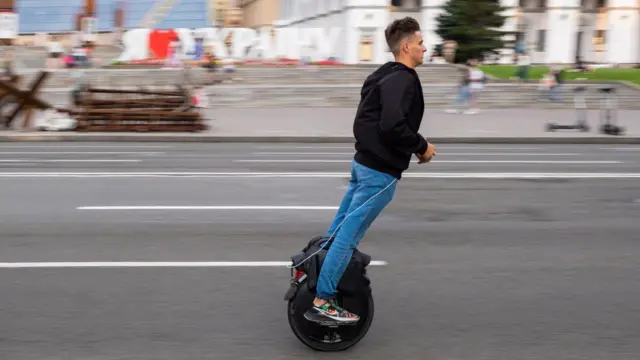
Author of the photo, UNIAN
The decision to go now is justified by the desire to see the world before the border is finally closed to him. Mykhailo will turn 18 in November 2024.
The guy doesn't erase Ukraine from his horizon - in a year or so he plans to return home: "People I love live here."
He is not afraid of mobilization in words, but he does not burn with the desire to fight: "I have such a lifestyle - if called, I will go."
Demographic challenges for Ukraine
The State Border Service does not keep statistics of those who left Ukraine by age, so there is no data on the number of seventeen-year-olds who left Ukraine this summer, says Oleksiy Pozniak from the Institute of Demography and Quality of Life of the National Academy of Sciences of Ukraine.
Yes, boys were taken out before the age of 18, probably in 2022 and 2023.
Ella Libanova, director of the Institute of Demography and Social Research, told BBC Ukraine that the total number of Ukrainian citizens who left Ukraine in 2024 did not significantly increase compared to last year.
"This means that there is currently no new wave of mass emigration of people from Ukraine," the sociologist explains.
But it gives a not too comforting general demographic assessment of the situation in the country.
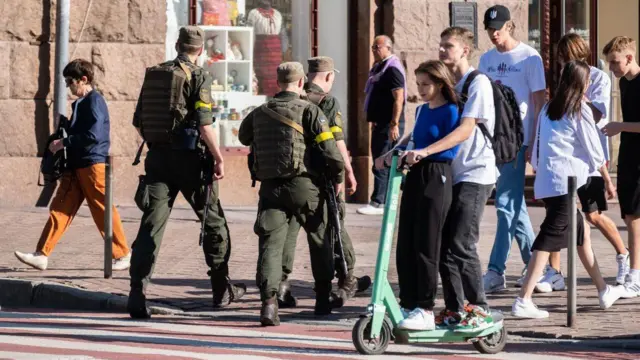
Author of the photo, UNIAN
According to Eurostat, children under the age of 18 make up a third of those who emigrated when hostilities began.
The specific consequences of these losses will depend on what proportion of those who left will return after the end of the war, as well as on when, in the end, it will end, Ella Libanova explains.
"Previously, we relied on the option of ending the war by 2025. Now we understand that it can be both 2027 and 2030. It is almost impossible to calculate the consequences and make forecasts in the conditions of the unpredictability of the development of events," the sociologist explains.
One of the possible challenges may be a change in the sex-age structure of the population. The mobilization of men and the departure of women abroad makes finding a partner more and more difficult. Fewer marriages means fewer children – with all the possible demographic consequences.
Ministry of Return of Ukrainians
According to the Ministry of Social Policy, 31 million people currently live in the territory controlled by Ukraine. Another four million - in the temporarily occupied territories, about one and a half million - deported to Russia and Belarus. According to the agency's dynamic estimates, another three and a half million left for Europe and the USA, fleeing the war.
Although the EU gives the official number of refugees at 4.2 million.
Over the past ten years, Ukraine has been the leader in terms of the number of residence permits issued for the first time in the EU. In 2021, 873,700 Ukrainian citizens received such a document, reports the Ministry of Social Policy.
And even before the full-scale invasion, up to three million labor migrants and students lived abroad, according to the Ministry of Social Policy.
Demographic crisis is characteristic of all developed countries, say the Ministry of Social Policy, because due to globalization and open borders, people often move from one country to another.
"Migration is our new reality," insists Daryna Marchak. "Ukraine competes with the whole world both for its own citizens and for immigrants, which we will need to rebuild the country after the end of the war."
The official says that point solutions do not work, a comprehensive approach is needed:
"Increasing payments at the birth of a child does not affect the growth of the birth rate in the long term. Increasing the number of medical facilities or, for example, increasing the number of doctors alone does not solve the problem of premature mortality."
People need security, affordable housing, the opportunity to find a job in a profession with decent pay, developed accessibility, social cohesion of society and mutual support.
Of course, in the conditions of a great war, shelling and daily deaths in the rear cities, it is difficult to ensure this.
The government has developed a strategy for the demographic development of Ukraine until 2040.
Among the key tasks is the return of not only those who left after the war, but also those who have already settled abroad and even received citizenship. And also - creating conditions for Ukrainians to maintain contact with home. The strategy is awaiting review and approval.
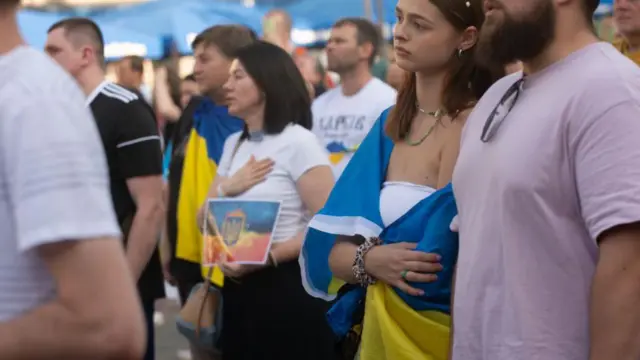
Photo credit: Ying Tang/Getty Images
It is also inevitable to revise the standards of higher education.
As of the beginning of 2024, a quarter of Ukrainian schoolchildren expressed a desire to move to live abroad, according to the results of a survey by the SaveEd International Charitable Foundation.
Currently, we are losing the best, confirmed Oksen Lisovyi in his interview.
"Despite the harsh circumstances of the war, we will not have a generation lost because of the war," President Zelenskyi said in his speech at the Ukrainian Youth Forum.
Subsequently, during the press conference, he announced the creation of a new institution with the working name - the Ministry of Return of Ukrainians. During the renewal of the government, the authorities even announced that they were looking for a minister for the new ministry.
Whether the Ukrainians themselves will want to return remains a big question. Sociologists are unanimous here: everything depends on exactly how and when the war will end.

